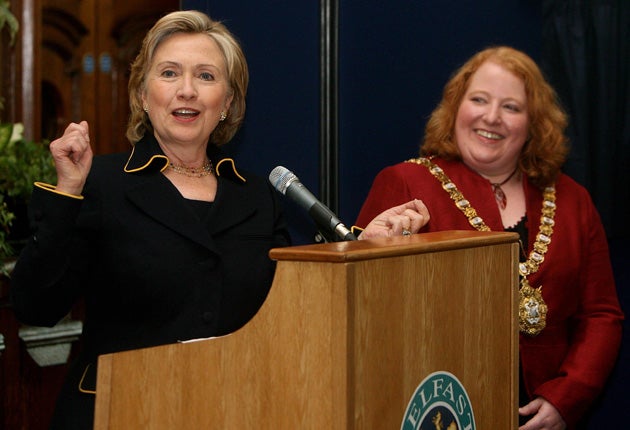Settle your differences, Clinton tells Ulster
US Secretary of State calls for unfinished business of devolution to be resolved

Hillary Clinton, the US Secretary of State, yesterday told the assembled politicians of Belfast, diplomatically but unmistakeably, that the time had come to complete the unfinished business of devolution.
In her address to the Northern Ireland Assembly, she complimented representatives on how far they had come in the process, but in meetings with their leaders and in other public comments, she urged them to clinch the deal on transferring policing and security powers from London to the Assembly in Belfast.
Mrs Clinton held meetings with the First Minister, Peter Robinson, from the Democratic Unionists (DUP), and the Deputy First Minister, Martin McGuinness, from Sinn Fein.
The US, she told the Assembly, would not "meddle" in the process of devolution for policing and justice. But one of the messages of her one-day visit was that policing was essential for increased stability and that stability would make US investment and job creation more likely.
Her pressure, together with that emanating from London and Dublin, was directly aimed at Mr Robinson and his party, whose misgivings have caused many months of delay in putting policing in place.
Not all in the DUP are keen on speedy movement, harbouring many instinctive reservations about the Assembly and its system, which locks them into government with Sinn Fein.
While the rest of the Assembly gave Mrs Clinton a standing ovation, two Democratic Unionist members, Gregory Campbell and the Reverend William McCrea, headed for the doors of the chamber. A Sinn Fein member, Daithi McKay, called on them to apologise for "publicly snubbing the US Secretary of State".
Mr Campbell, a Westminster MP, denied that he had staged a walkout, advancing the explanation that "we all have important business to do, particularly the economic regeneration of Northern Ireland".
The episode fuelled widespread suspicion that Mr Robinson's delay tactics over the introduction of policing powers have been motivated by more than his concerns about potential additional costs of up £500m.
Gordon Brown, who last week was involved in hours of negotiations with Mr Robinson and Mr McGuinness, yesterday sent them details of an offer dealing with the monetary aspects of the policing dispute. The two leaders appear to be pleased with this.
In this instance Sinn Fein is – for once – on the side of the angels, in that republicans are at one with the various governments in wanting a quick end to the policing dispute. They are also fully in favour of maximum US involvement in the peace process.
Some Unionists have misgivings about what they would see as too much US intervention, harbouring lingering doubts that Washington might lean towards republican interests.
Mrs Clinton's pledge not to "meddle" may have been her attempt to allay such fears. As an old Northern Ireland hand – she first visited Belfast with her husband 14 years ago – she would know well that such assurances may be necessary.
Mr Robinson reflected such concerns when he declared last week: "We are not going to be pushed or bullied or bribed."
Policing: Last piece in devolution jigsaw
*Powers over policing and justice are the last part of the devolution jigsaw yet to be transferred from London to Belfast.
*Responsibility for areas such as education, agriculture and housing was handed to Belfast several years ago.
*Policing is regarded as a particularly sensitive issue.
*It has already been agreed that neither Sinn Fein nor the Democratic Unionists would supply the minister who will run a new justice ministry.
*All the major parties have agreed that policing should be devolved – the key issue is when and how.
*Sinn Fein, London and Washington want to make the move as early as possible. The Democratic Unionists want more time, as well as assurances that extra costs will be met by London.
*Gordon Brown has finalised a financial package he hopes will satisfy the Unionists. They say they will study it.
Join our commenting forum
Join thought-provoking conversations, follow other Independent readers and see their replies
Comments
Bookmark popover
Removed from bookmarks